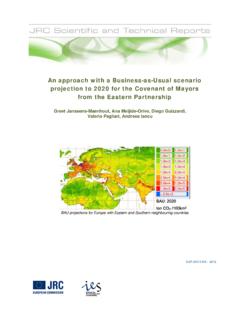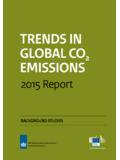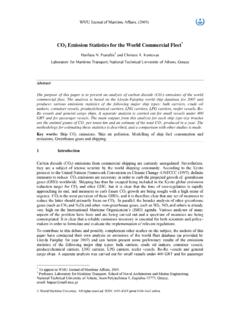Transcription of Emission Reporting Corporate Greenhouse Gas - …
1 Please cite this paper as:Kauffmann, C., C. T bar Less and D. Teichmann (2012), Corporate Greenhouse Gas Emission Reporting : AStocktaking of Government Schemes , OECD WorkingPapers on International Investment, 2012/01, Working Papers on InternationalInvestment 2012/01 Corporate Greenhouse GasEmission ReportingA STOCKTAKING OF GOVERNMENT SCHEMESC line Kauffmann, Cristina T bar Less,Dorothee TeichmannJEL Classification: F23, G32, L15, M4, Q56 OECD WORKING PAPERS ON INTERNATIONAL INVESTMENT The international investment working paper series including policies and trends and the broader implications of multinational enterprise is designed to make available to a wide readership selected studies by the OECD Investment Committee, OECD Investment Division staff, or by outside consultants working on OECD Investment Committee projects.
2 The papers are generally available only in their original language English or French with a summary in the other if available. This work is published on the responsibility of the Secretary-General of the OECD. The opinions expressed and arguments employed herein do not necessarily reflect the official views of the Organisation or of the governments of its member countries. This document and any map included herein are without prejudice to the status of or sovereignty over any territory, to the delimitation of international frontiers and boundaries and to the name of any territory, city or area. Comment on the series is welcome, and should be sent to either or the Investment Division, OECD, 2, rue Andr Pascal, 75775 PARIS CEDEX 16, France. OECD WORKING PAPERS ON INTERNATIONAL INVESTMENT are published on OECD 2012 Applications for permission to reproduce or translate all or part of this material should be made to: OECD Publishing, or by fax 33 1 45 24 99 30.
3 * This report was written by C line Kauffmann (Regulatory Policy Division), Cristina T bar Less (Investment Division), and Dorothee Teichmann ( Corporate Affairs Division), with inputs from Christa Clapp (Climate Change, Biodiversity and Development Division) and H ctor Lehued ( Corporate Affairs Division). It was submitted for comments to the Working Party of the Investment Committee, the Environment Policy Committee s Working Party on Climate, Investment and Development and the Corporate Governance Committee. It also benefitted from useful suggestions from participants in various stakeholder consultations and workshops held in the framework of this project. Further information on investment for green growth work at the OECD may be found at Abstract Corporate Greenhouse GAS Emission Reporting : A STOCKTAKING OF GOVERNMENT SCHEMES by C line Kauffmann, Cristina T bar Less and Dorothee Teichmann* Abstract This paper provides an overview of current government schemes promoting Corporate Reporting of Greenhouse gas (GHG) emissions and analyses their main building blocks.
4 It describes the drivers and challenges for governments, companies and investors in dealing with GHG Reporting and includes 4 case studies examining in more depth the domestic GHG Emission Reporting schemes of the UK, France, Japan and Australia. This work is part of a project with UNCTAD, the Climate Disclosure Standards Board (CDSB) and the Global Reporting Initiative (GRI) on consistency of climate change Reporting . JEL Classification: F23, G32, L15, M4, Q56 Keywords: climate change, Reporting , Greenhouse gas emissions. Corporate governance, responsible business conduct, Emission trading 5 TABLE OF CONTENTS TABLE OF CONTENTS .. 1 EXECUTIVE SUMMARY .. 7 Corporate Reporting of Greenhouse gas emissions is steadily increasing .. 7 Motivations, benefits and challenges of GHG Reporting for companies, governments and investors.
5 7 Lessons learnt in developing and implementing GHG Reporting schemes .. 8 INTRODUCTION .. 11 OVERVIEW OF Corporate CLIMATE CHANGE Reporting .. 13 Trends in climate change Reporting .. 13 Types of climate change Reporting provisions .. 15 MOTIVATIONS FOR CLIMATE CHANGE Reporting AND ASSOCIATED CHALLENGES .. 21 Motivations for governments to request Corporate GHG information .. 22 Challenges for governments .. 24 Motivations for companies to measure and report GHG emissions .. 26 Challenges for companies .. 28 Motivations for investors .. 31 Challenges for investors .. 32 BUILDING BLOCKS OF GHG Reporting 35 Reporting requirements affecting companies .. 35 Elements of Reporting schemes requiring action by governments .. 38 LEARNING FROM COUNTRY EXPERIENCE: CASE STUDIES .. 41 UK: levering Corporate action through peer and investors pressure.
6 41 France: towards a mandatory Reporting framework through a broad consultation process .. 48 Japan: from energy saving programs to climate change Reporting .. 53 Australia: addressing multi-level governance of carbon Reporting .. 57 Comparative analysis: some general lessons from different national experience .. 59 ANNEX 1 SELECTED GOVERNMENTAL GHG Reporting SCHEMES .. 63 BIBLIOGRAPHY .. 69 7 EXECUTIVE SUMMARY Corporate Reporting of Greenhouse gas emissions is steadily increasing A growing number of companies assess and address the potential threats and opportunities of climate change for their business. They measure the Greenhouse gas (GHG) emissions generated by their activity, and assess their exposure to physical climate change impacts as well as changing market conditions and consumer preferences as a consequence of climate change.
7 At the same time, there is also an increasing demand from governments, investors and other stakeholders for Corporate climate change-related information. The OECD Guidelines for Multinational Enterprises, updated in May 2011, reflect the increasing stakeholder demand for more Corporate transparency by encouraging companies to disclose environmental information with high quality standards, particularly in the case of Greenhouse gas emissions, as the scope of their monitoring is expanding to cover direct and indirect, current and future, Corporate and product emissions . Since the late 1990s, a number of mandatory or voluntary government schemes have emerged, which, together with emerging non-governmental initiatives, require or encourage enterprises to measure and report their GHG emissions.
8 These requirements are part of environmental and other non-financial disclosure requirements; of policy instruments that put in place a carbon price, such as carbon taxes and Emission trading schemes; or of listing requirements of stock exchanges. Recent trends show an increasing number of government schemes, with some countries exhibiting a range of schemes operating or under development at both sub-national and national levels. With the growing number of Reporting schemes, the number of companies or entities Reporting under mandatory or voluntary Reporting schemes has also steadily increased. The EU ETS now operates in 30 countries and covers CO2 emissions from some 11 000 installations. In Japan, in 2009, over 11000 enterprises reported their CO2 emissions under the mandatory GHG Accounting and Reporting system, accounting for about half of the total emissions of Japan nationwide, and in the around 6 700 entities reported data in 2010 under the GHG Reporting Program, covering roughly 80% of total GHG emissions.
9 Motivations, benefits and challenges of GHG Reporting for companies, governments and investors For governments, the main motivation to request GHG Emission information from companies is to induce companies to reduce their GHG emissions, and to facilitate investors access to this information. The information itself is used for different purposes by governments, for example, to support Emission trading schemes, where they exist; as a complement of domestic climate change policies, and to refine national GHG inventories. Most government GHG Reporting schemes (in particular those linked to Emission trading schemes) mainly ask companies to disclose GHG emissions. Some schemes go further and invite companies to report on Emission reduction targets and other climate change related information.
10 In developing and implementing GHG Emission Reporting schemes, governments face challenges: finding the right balance between collecting meaningful information without putting an excessive burden on companies, achieving the necessary policy coherence and coordination of different pieces of legislation ( integrating carbon Reporting with other Reporting requests), and putting in place the right incentives to motivate companies to act, in order to reduce emissions. Investors are key stakeholders in Corporate GHG Reporting : by scrutinising this information and integrating it into investment decision-making they can act as levers for Corporate climate change action. Investors interest in companies climate change-related information has increased, but there is little evidence on the actual weight of this information in terms of investment decisions.















